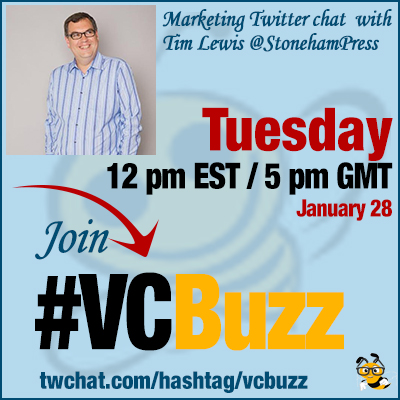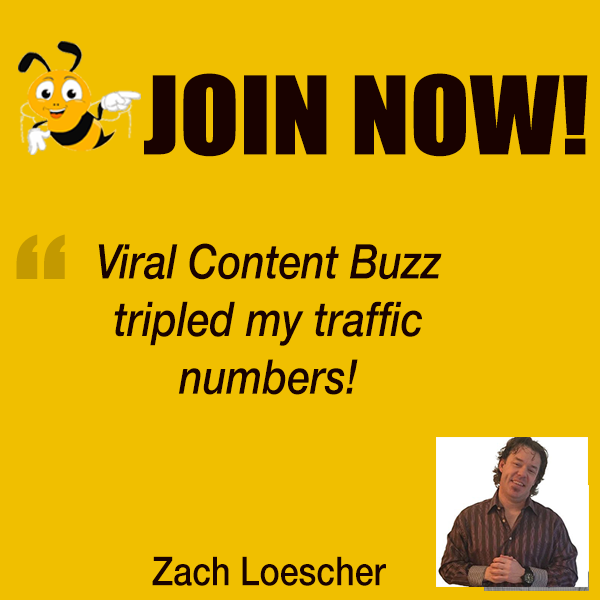
The Internet gave everyone a voice.
If you have something to say, you can now be heard.
But not just that.
These days everyone can become a published author without depending on an expensive and demanding publisher.
How to become a self-published author? Let’s discuss!
***Add #VCBuzz chats to your calendar here.
***Please sign in here to follow the chat -> twchat.com/hashtag/vcbuzz
About Tim Lewis @StonehamPress
Tim Lewis @StonehamPress is author, podcaster and speaker.
Tim’s latest book, Social Media Networking covers how to use social media to get the job you want, find love and increase your travel experience, based on Tim’s own experiences.
Tim is the host of the Begin Self-Publishing Podcast – which you can find at www.beginselfpublishing.com.
Questions we discussed
Q1 How did you become an online entrepreneur? Please share your career story!
In 2014, 3 years after being widowed in 2011 I gave up my IT job initially with the idea of doing IT contract work, but during my notice period I read a book on self-publishing (Write, Publish, Repeat) and decided instead to self-publish time travel books.
However despite writing 6 fiction novels (3 time travel and 3 fantasy) I got more and more interested in online business, marketing and helping other people to self-publishing.
@hireblogger They are available on Amazon, Kobo, iBooks and a bunch of other stores as an eBook and available as a paperback from Amazon. https://t.co/hIoP72FQC6 is my last one #vcbuzz
— Tim Lewis @Stoneham Press #indieAuthorChat (@StonehamPress) January 28, 2020
My last book was the non-fiction book Social Media Networking where I interviewed people about their experiences of using social media to get great opportunities. I run the #indieAuthorChat Twitter chat and the Begin Self-Publishing Podcast.
Q2 Why would anyone want to become a (self-)published author. In other words, who would find our today’s discussion useful?
For the same reasons anyone would want to be an author in general. If you feel you have a book in you, you have a story to tell, or a point that you want the world to understand, then writing a book can be a fantastic way to do that.
Q3 Where to start and how to move forward?
The hardest part of writing a book is the actual writing part. I recommend creating a plan with at least the chapter headings and a few sentences about what happens (or the topics) in that chapter before doing any writing.
It's really whatever works – I use the synopsis section on Scrivener. You can plan things as much or as little as you like but it's important to have a plan somewhere (even if just in your head). #vcbuzz
— Tim Lewis @Stoneham Press #indieAuthorChat (@StonehamPress) January 28, 2020
Once you have the plan, try to write the book as quickly as possible. Once you have the completed manuscript you need to get it edited and get a cover designed. Then get the eBook and paperback documents created from the edited manuscript.
These versions can then be uploaded to store portals such as KDP (for Amazon) and aggregators like PublishDrive, Ingram Spark and Draft2Digital for other stores/platforms. Audio versions can also be created an uploaded to services such as ACX and Findaway Voices.
Well I've never actually done it personally, but most fiction authors hire a narrator (as it's a real skill to narrate fiction), while for non-fiction you can just record and process your audio like for a podcast. #vcbuzz
— Tim Lewis @Stoneham Press #indieAuthorChat (@StonehamPress) January 28, 2020
Keep in mind the quality expected for Audible is a lot higher than for a podcast, e.g no umms, arghs etc.
For a fiction book you might well be better using ACX or something dedicated as they need to make different character voices etc. #vcbuzz
— Tim Lewis @Stoneham Press #indieAuthorChat (@StonehamPress) January 28, 2020
Q4 How to sell your first copies? What are your favorite book marketing tips?
The #1 problem most authors (trad and self-published) have is marketing. The ideal first people to sell to is people who love the genre of book you have written. Failing that friends and family and anyone who owes you a favour can be your sales for your first book.
But you should try to capture e-mail addresses or other contact information for readers of your book so for your next book you can promote your new book directly to new readers. Alternatively communities of readers are good places to find potential readers.
Another approach is to use services like BookBub that promote fiction books to an email list, however these require a number of good reviews which means you need initial sales before you can access them. Facebook and Amazon ads can work for books in a series.
Book Marketing is tough as books are generally low value products; often people make money on the non-fiction side from selling courses and speaking opportunities rather than from the book itself.
So if you have a book "How to do yoga" you can teach online yoga courses or actual physical yoga stuff. Someone like @CSCarrigan is very good at this. #vcbuzz
— Tim Lewis @Stoneham Press #indieAuthorChat (@StonehamPress) January 28, 2020
Q5 What are your favorite self-publishing and book marketing tools?
A good place to start for unbiased self-publishing advice is the Alliance Of Independent Authors’s blog, if you prefer audio then my podcast Begin Self-Publishing might suit you beginselfpublishing.com
In terms of software, I recommend Word or Scrivener for writing/planning the book and Vellum for formatting the book for eBook and Paperback, though there are free services like Reedsy‘s Book Editor as well.
If you already have the material and you have instant access to reasonable editing (or it's been pre-edited before) then it's perfectly possible to have one done in a week. But it's always better to allow longer until you learn the ropes. #vcbuzz
— Tim Lewis @Stoneham Press #indieAuthorChat (@StonehamPress) January 28, 2020
A lot depends on your intentions. If you are looking for sales then marketing efforts can take a long time to arrange and plan, and you might need to wait for the editor you want to become available etc. It’s basically a project with lots of little individual cogs.
For marketing books, I’d suggest listening to podcasts like @PaulTeagueUK‘s Self-Publishing Journeys and @theCreativePenn‘s podcast and the Sell More Books Show (@smbspodcast) as a start. ALLi’s blog has a lot on this topic as well.
Well for my first books Facebook advertising worked really well, but that was in 2014 and it's too competitive now if you just have one book (assuming you aren't selling services etc) #vcBuzz
— Tim Lewis @Stoneham Press #indieAuthorChat (@StonehamPress) January 28, 2020
Another thing that did work was being active in genre Facebook/Goodreads groups. That way you build up friends/people interested in your books.



